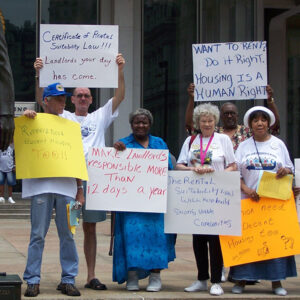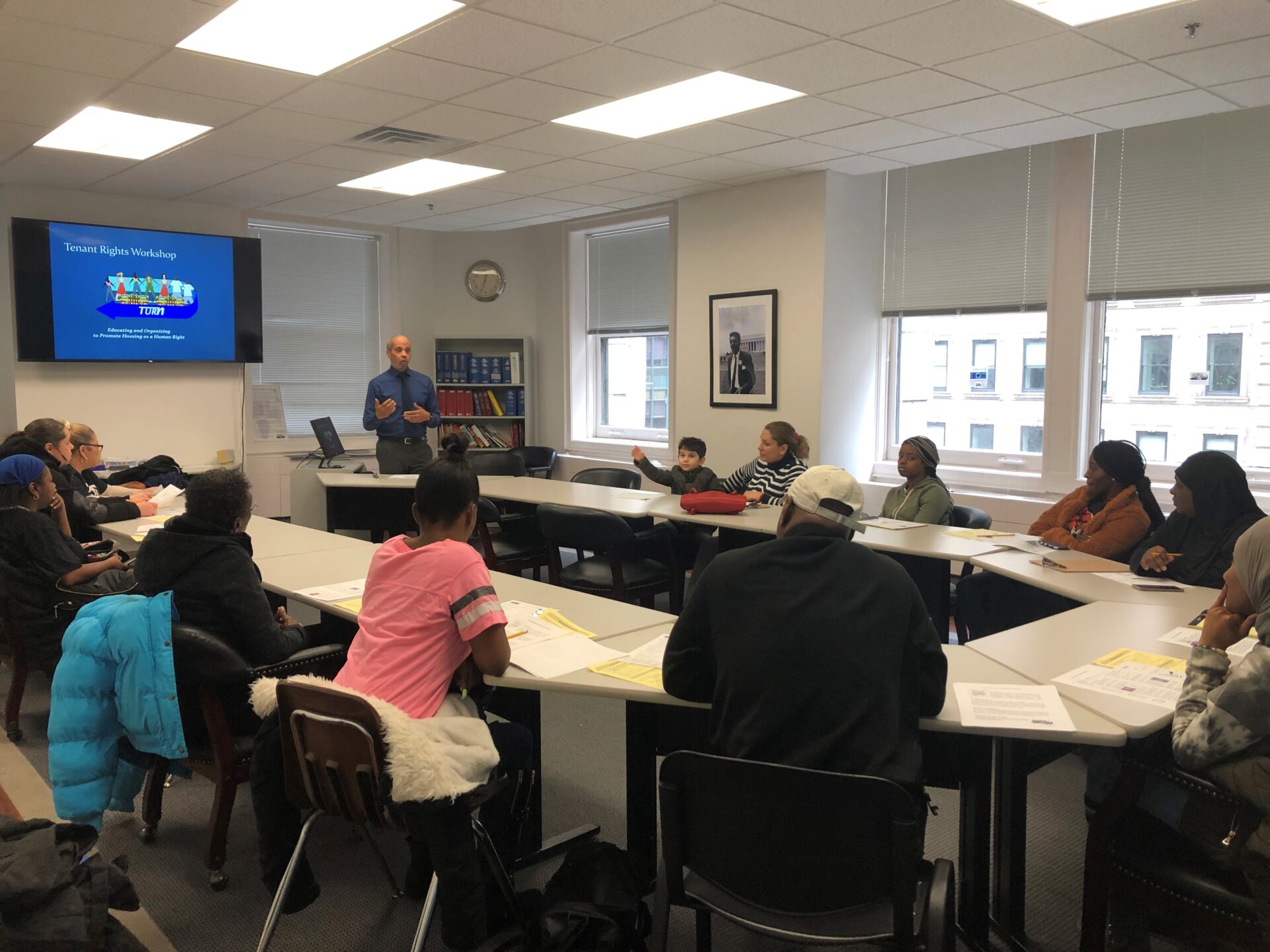Putting Housing First
View more stories from our 2020 Annual Report
“Housing is a fundamental human right,” says Phil Lord, executive director of the Tenant Union Representative Network (TURN). “Our vision is for society to recognize housing not just as a social service, a public benefit, or a luxury or an investment, but really as a human right that everyone is entitled to a decent place to live.”
 For people to understand and recognize this, TURN offers educational workshops, one-on-one counseling, hotline assistance, and more. The first line of support for people who have questions about landlord tenant issues is the hotline. If a phone call is not adequate to solve the problem, people are directed towards TURN’s workshops and classes that are offered every day and sometimes twice a day. These classes are open to the public and have no restrictions on who can participate. From there, if more personalized help is necessary, people can make an individual appointment with a housing counselor. Many housing counseling agencies focus on homebuying rather than rental issues in particular, which makes TURN’s services even more crucial.
For people to understand and recognize this, TURN offers educational workshops, one-on-one counseling, hotline assistance, and more. The first line of support for people who have questions about landlord tenant issues is the hotline. If a phone call is not adequate to solve the problem, people are directed towards TURN’s workshops and classes that are offered every day and sometimes twice a day. These classes are open to the public and have no restrictions on who can participate. From there, if more personalized help is necessary, people can make an individual appointment with a housing counselor. Many housing counseling agencies focus on homebuying rather than rental issues in particular, which makes TURN’s services even more crucial.
Providing housing counseling and educational services is a large part of what TURN does, but they go even further by organizing tenants to speak for themselves and raise issues of concern. TURN is uniquely positioned because they give people an avenue to join together and advocate for systemic change. As Lord expresses it, “people benefit not only from our services but also from a sense of being involved, and that’s the kind of benefit you can’t put a price tag on.”
TURN does important work empowering tenants to organize for equitable change. Their exemplary work earned them Reinvestment Fund’s Community Champion award, which recognizes nonprofit organizations that are aligned with Reinvestment Fund’s own mission.
However, providing a steady stream of services in an uncertain economic environment can be challenging. TURN has grant contracts to provide services to vulnerable populations, but receipt of funds can be late. In addition, the pandemic has created more delays than usual at a time when demand for services is high. Services that cost the most to provide include client rental assistance payments and security deposits to prevent or end homelessness for tenants with low incomes.
Keeping everything running when payments could be late was almost impossible, which is why TURN approached Reinvestment Fund for financing. Reinvestment Fund provided a loan to help bridge the receipt of funds for TURN’s services. The loan helps to ensure, in part, that TURN can provide these services regardless of timing issues in receiving its grant funds.
The loan is “our life blood that we could not function without. It’s not just a benefit but is critical to our survival and functioning as an organization,” says Lord.
Many organizations have struggled during the pandemic, but with this bridge loan, TURN has taken it in stride. They started offering services over Zoom and stepped up to assist people as they navigate the challenges COVID-19 has presented to staying housed. Lord elaborates, saying, “People are waking up to the crisis around housing and COVID is clarifying the discrepancies . . .the crisis will not go away when COVID goes away.”

TURN teaches people what discrimination looks like and what their rights are, which is even more necessary in current times.
One of those disparities evident before the pandemic that has been clearly exposed is the difference in eviction filings by race. Reinvestment Fund’s research found that Black renters face disproportionately high rates of evictions in Philadelphia. This study and others like it present hard data proving that a pattern exists and it is a systemic issue, which TURN uses to support their advocacy work and in their educational classes. “Very often people think it’s just me, but we say it’s not just you, it’s the system that treats you differently than other people,” conveys Lord.
TURN teaches people what discrimination looks like and what their rights are, which is even more necessary in current times. Even with rental assistance, people are still falling behind in paying their rent. Lord says, “COVID has made things a lot worse but it hasn’t fully materialized yet . . . when the moratoriums end we expect a housing crisis of proportions we haven’t seen before.”
TURN has been preparing for this, and new programs and resources are currently in the pipeline to production. However, since rental assistance programs and eviction moratoriums have temporarily mitigated the problem, now is the time to focus on the big picture and what kind of systems changes are crucial to put housing first. Lord declares, “It’s not just about people being generous or forward looking… The first step is the commitment, a real commitment, to saying everybody is going to have a decent place to live, and then you have to make it a reality, and that’s the hard part.”